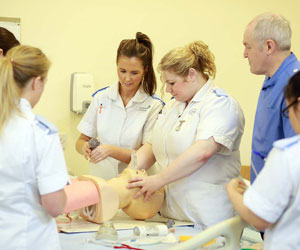What is a degree apprenticeship?
A degree apprenticeship combines degree level education with on the job training helping you to develop your management expertise while you work. This alternative university route is designed in collaboration with industry to create new talent solutions that meet the needs of both learners and employers with tuition fees covered by your employer and/or government funding.
Course Overview
This will involve developing the professional knowledge, skills and behaviours to care for people across the lifespan (pre-conception to end of life), with diverse needs (physical, mental health and learning disabilities) in a range of settings (home, community and inpatient settings). As an apprentice you will be working in professional employment whilst also learning in the workplace utilising a structured delivery pattern, supported by both the university/employer.
By the end of programme, you will be familiar with the concept of reflective practice, lifelong learning, and will have a comprehensive portfolio. You will have a repertoire of clinical skills which you will be able to transfer and adapt appropriately enabling you to work in a variety of healthcare settings. On completion of the programme you will have completed a FdSc Nursing Associate, which is registrable with the NMC. Following this you will undertake your end point assessment to complete your apprenticeship. Completion of this programme will allow you to top up to BSc practice development or APL up to a maximum 50% registered nurse programme in any of the 4 fields of nursing (adult, mental health, learning disability or child).
Course outline
Course summary
The nursing associate role is a highly trained support role to deliver safe, effective and responsive, person centred nursing care in and across a wide range of health and care settings, ranging from pre life to end of life This programme will prepare you by ensuring you have the necessary knowledge, clinical skills, attitudes and behaviours to take on this new and innovative role. The learning outcomes are outlined in: Nursing Associate Curriculum Framework, (Health Education England, 2017 available at Health Education England
The programme will focus on the skills, attitudes and values and knowledge required to perform the role to a high standard.
During the programme you will explore:
1. Professional values and how to enact these responsibly within the role of nursing associate.
2. Person centred approaches to care - ensuring you can exercise the skills, attitudes and behaviours that support the planning, delivery and evaluation of high quality, person centred, holistic care
3. Delivering care - equipping you to work across organisational boundaries in a range of health and care settings and apply in practice the range of clinical and care skills appropriate to your role.
4. Communication and interpersonal skills – enabling you to communicate effectively across a wide range of channels and with a wide range of individuals, the public, health and social care professionals and developing those interpersonal skills that promote clarity, compassion, empathy, respect and trust.
5. Team working and leadership - exploring the principles underpinning leadership frameworks and associate team working and leadership competencies and demonstrate a range of those competencies, attitudes and behaviours required of a nursing associate.
6. Duty of care, candour, equality and diversity - allowing you to explain the principles underpinning duty of care, equality and diversity and the need for candour, consistently demonstrating the application of those principles in and across a range of settings across the life span.
7. Supporting learning and assessment in practice - demonstrating those skills, attitudes and behaviours that support personal development and lifelong learning, as well as those associated with the development of others.
8. Research, development and innovation – evidencing the importance of research and innovation, and being research aware, across the health and care landscape. In your role you will explore how this improves the quality of patient/individual safety and care and addresses the challenges faced in the context of rising public expectations
Applicants must be working in a nursing setting and have the support of their employer - as evidenced by a letter of support from the employer confirming commitment to the programme including provision of appropriate supervision and assessment; support to attend University and placements to enable students to meet the Standards of Proficiency for Nursing Associates, (NMC).
Modules
Year One
- NUAS4001 - Applied Biological Sciences for Health
- NUAS4002 - Professional Practice and Accountability
- NUAS4003 - Developing Evidence Based Practice
- NUAS4004 - Introduction to Communication and Interpersonal Skills
- NUAS4005 - Concepts of Health and Social Policy
- NUAS4006 - Introduction to Nursing Associate Practice
- NUAS9001 - Qualificatory Practice Unit 1 - clinical skills
Year Two
- NUAS5001 - Pharmacology and Medicine Therapeutics
- NUAS5002 - Living with Long Term Conditions Across the Lifespan
- NUAS5003 - Learning from the 'Lived' Experience
- NUAS5004 - Communication and Relationship Management in a Therapeutic context
- NUAS5005 - Understanding Care Needs
- NUAS5006 - The Nursing Associate as Leader
- NUAS9002 - Qualificatory Practice Unit 2 - clinical skills
Programme Specification
For detailed summary of all course content, please read our programme specification for this course.
Assessment, Feedback, and Teaching and Learning methods
Full details are available in the programme specification.
Timetables
The teaching timetable should be available from the end of August. Access to the timetable is through the Student Hub – you will be able to access the Student Hub after you have completed online registration. The teaching day is 9am to 6pm, Monday to Friday; please keep your other commitments open until confirmation of your teaching timetable, and bear in mind that many courses will offer placements or fieldwork which sometimes extends into the evenings and weekends.
Entry requirements
Have a question about our entry requirements?
Entry Requirements
- Certificates must be provided to prove English (Language) and Maths to GCSE grades 4-9 or Functional Skills Level 2 or equivalent.
- NVQ Level 3 or equivalent portfolio of evidence (as determined by the programme leader) please refer to the applicant information pages of the university website for more information.
- For APL, please refer to the university website. Each candidate will be dealt with on a case-by-case basis. A maximum 50% programme can be APL (NMC requirements)
- International students require an IELTS certificate that confirms a minimum score of 6.5 in writing alongside a minimum of 7.0 in reading, listening and speaking, so long as the minimum overall score of 7.0. Alternatively, an OET examination certificate that confirms the achievement of at least a B grade in the writing, reading, listening and speaking sections. (Access NMC link for more information) English language NMC requirements.
Personal statement - Applicants should demonstrate their motivation for the programme and reflect upon any practical experience they have gained. Experience in a setting that encompasses caring and/or interpersonal skills in either a formal or informal context is essential.
Programme entry criteria
The NMC (2018) stipulate that together with practice learning partners, on entry to the programme applicants must:
- demonstrate values in accordance with The Code (NMC, 2018)
- have capability to learn behaviours in accordance with The Code
- have capability to develop numeracy skills required to meet programme outcomes
- demonstrate proficiency in English language
- have capability in literacy to meet programme outcomes
- have capability for digital and technological literacy to meet programme outcomes
University Selection Criteria Certificates must be provided to prove English (Language) and Maths to GCSE Grades 4-9 or Functional Skills Level 2.
NVQ level 3 or equivalent portfolio of evidence (as determined by the programme)
Government funding criteria
An apprentice must have the right to live and work in the UK, must be in employment, paid at least the legal minimum wage and have a written and signed agreement for the apprenticeship with their employer. The minimum duration periods for an apprenticeship set in each Apprenticeship Standard is based on an apprentice working a minimum of 30 hours per week.
Degree apprenticeships are only offered to students undertaking the course as part of their employment. The apprenticeship training is therefore funded by the employer using their apprenticeship levy, with or without a contribution depending on the size and status of the organisation.
Apprentices will not be required to pay any fees and will not be eligible for Student Finance England maintenance support as they are in receipt of a salary. See further information on our Information for Aspiring Apprentices page.
The University will typically charge the maximum fee for the standard, before applying reductions based on accepted prior learning which is determined at application on an individual basis. To discuss sponsoring a learner on programme please contact apprenticeships@cumbria.ac.uk.
Employer selection criteria
All apprentices must be interviewed, assessed and offered a position by an employer before being admitted to the apprenticeship programme. Although the University may receive direct enquires and filter these before passing to prospective employers, apprentices must apply directly via an employer.
The employer is responsible for the final decision in terms of who is suitable to be put forward as an apprentice from within their organisation.
How to apply
To apply for the apprenticeship, the employer and the individual must submit a joint application form. Please contact us at apprenticeships@cumbria.ac.uk for the application form and further guidance.
Degree apprenticeships are only offered to students undertaking the course as part of their employment. The apprenticeship training is therefore funded by the employer using their apprenticeship levy, with or without a contribution depending on the size and status of the organisation.
Apprentices will not be required to pay any fees and will not be eligible for Student Finance England maintenance support as they are in receipt of a salary. See further information on our Information for Aspiring Apprentices page.
The University will typically charge the maximum fee for the standard, before applying reductions based on accepted prior learning which is determined at application on an individual basis. To discuss sponsoring a learner on programme please contact apprenticeships@cumbria.ac.uk.
Student finance
We have a wide range of scholarships, bursaries, grants and funds available to support you throughout your studies with us. This includes the Cumbria Bursary - a non-repayable bursary designed to support first year students with a household income of less than £25,000..
Student Finance Tuition Fee PolicyResources and facilities
On campus as a student you will have access to all the facilities offered to students by the university - library and academic support, sports centre, students union, student societies, clinical skills lab, health and well being services. You will be allocated a personal tutor - their role is to monitor your academic progress and provide support and advice In practice you will have access to a wide range of practice areas/ healthcare professionals to develop a broad range of knowledge and skills within nursing associate practice. This will be supported by a practice supervisor/assessor who will guide and support your practice learning and assess your level of clinical competency In addition as an apprentice you will have 10 weekly tripartite reviews where you, your practice assessor/supervisor and a member of university staff will meet to discuss your progress in developing the necessary knowledge, skills and behaviours required of the role and to set individual learning goals.






